北师大版高中英语必修一第7讲:Unit3-Celebration-词汇篇1(教师版)
- 格式:docx
- 大小:163.76 KB
- 文档页数:13

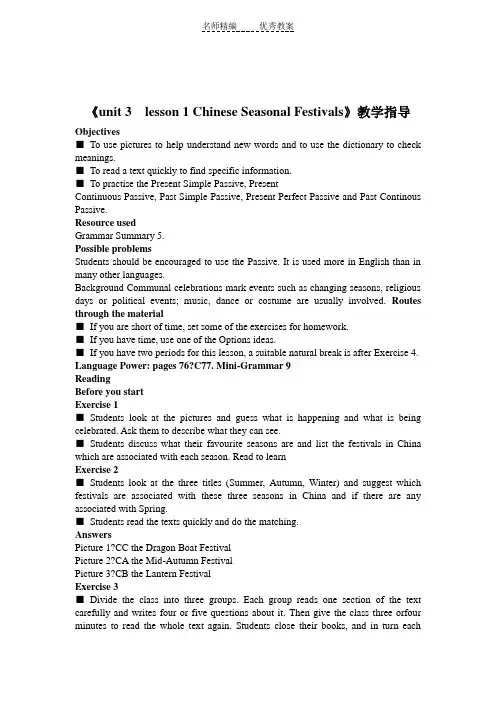
《unit 3 lesson 1 Chinese Seasonal Festivals》教学指导Objectives■To use pictures to help understand new words and to use the dictionary to check meanings.■To read a text quickly to find specific information.■To practise the Present Simple Passive, PresentContinuous Passive, Past Simple Passive, Present Perfect Passive and Past Continous Passive.Resource usedGrammar Summary 5.Possible problemsStudents should be encouraged to use the Passive. It is used more in English than in many other languages.Background Communal celebrations mark events such as changing seasons, religious days or political events; music, dance or costume are usually involved. Routes through the material■If you are short of time, set some of the exercises for homework.■If you have time, use one of the Options ideas.■If you have two periods for this lesson, a suitable natural break is after Exercise 4. Language Power: pages 76?C77. Mini-Grammar 9ReadingBefore you startExercise 1■Students look at the pictures and guess what is happening and what is being celebrated. Ask them to describe what they can see.■Students discuss what their favourite seasons are and list the festivals in China which are associated with each season. Read to learnExercise 2■Students look at the three titles (Summer, Autumn, Winter) and suggest which festivals are associated with these three seasons in China and if there are any associated with Spring.■Students read the texts quickly and do the matching.AnswersPicture 1?CC the Dragon Boat FestivalPicture 2?CA the Mid-Autumn FestivalPicture 3?CB the Lantern FestivalExercise 3■Divide the class into three groups. Each group reads one section of the text carefully and writes four or five questions about it. Then give the class three orfour minutes to read the whole text again. Students close their books, and in turn eachgroup asks its questions for the rest of the class to answer.■Students read the text again and fill in the table with the text information they get. ■Have students check their answers in pairs.■Encourage students to add another festival they know well.■Students read the questions and find the answers in the texts by reading the texts again.■Have students talk about their festival in pairs.AnswersPassage A:the Mid-Autumn Festival, September or October, moon cakesPassage B:the Lantern Festival, the fifteenth of the first month of the lunar calendar, sweet dumplingsPassage C:the Dragon Boat Festival, the fifth day of the fifth month of the lunar calendar, Zongzi Exercise 4■Students discuss in pairs and tell the class their opinions.Language Power: the Word Corner on page 79 givesfurther practice in vocabulary (clothes).GrammarTHE PASSIVE (I)Exercise 5■Students identify that the passive is used when we don’t know or there is no need to say who the “doer” of an action is.■Students then do the exercise, finding the sentences in the text and completing the verbs.■Refer students to Grammar Summary 5 to make sure they understand how to use the Passive correctly.■For further practice, ask students to answer questions about their school (or town), e.g. “When are school examinations held?When are school reports written? Where is football played?When are bells rung? When was this classroom cleaned? When was this school built?”Answers1. are made2. were, organizedExercise 6■ Have students look at the given sentences and ask them what tenses are used in them.■ Encourage students to draw rules for the formation of the passive forms. Ask them to refer Grammar Summary 1,3,4 and 5 on pages 92?C93.Answers1. has been arranged2. is being collected3. was being paintedExercise 7■ Ask students if they have heard of the Water Festival.■ Students re ad the text to find out about the festival. Then read the text again and complete the verbs.Answers1. is celebrated2. is splashed3. are carried4. are told5. is related6. are washed7. are raced 8. are launched■ Have st udents close their books and ask them to say what they can remember about the festival.Exercise 8■ Students work in pairs, changing the sentences into the passive. Answers1. My health is being affected by stress.2. People are being moved out of the houses.3. The mini-helicopter has already been invented by him.4. The forest fire has been put out by them.5. The car was being repaired when I got there.6. The house was being decorated when the accident happenedVocabularyExercise 9■ Student s may need to go back to the text to review the words before they start filling in the blanks.Answers1. is lit2. has decorated3. mark4. celebrate5. was included6. was burnt down7 take part in 8. be boiledLanguage in UseExercise 10■ Students work in groups, writing out the questions andadding more of their own questions using the Passive. Tell students they must know the answers to their questions. If you wish, they can finish the questions for homework and use reference sources to check their answers. Each group should have between 10?C15 questions.Answers1. Where is the Mid-Autumn Festival celebrated? (In China)2. Where is “zongzi” eaten? (In China)3. When is the Lantern Festival celebrated? (In China)4. Who was the telephone invented by? (By Alexander Graham Bell)5. Who was Romeo and Juliet written by? (By William Shakespeare)6. Where are BMW cars made? (In Germany)OptionsPracticeIn groups, students prepare a written description of SpringFestival in China. Tell students they are writing for English speaking readers who have not visited China. Students can follow the structure of the texts in the coursebook and, if possible, illustrate their text with a suitable drawing or photograph. When the groups have finished, they can exchange papers for others to read. ExtensionStudents, working individually or in pairs, carry out a research project (using reference books or the Internet) to find out about a seasonal festival in another country. Students then prepare a short talk about this festival to give to the class.。
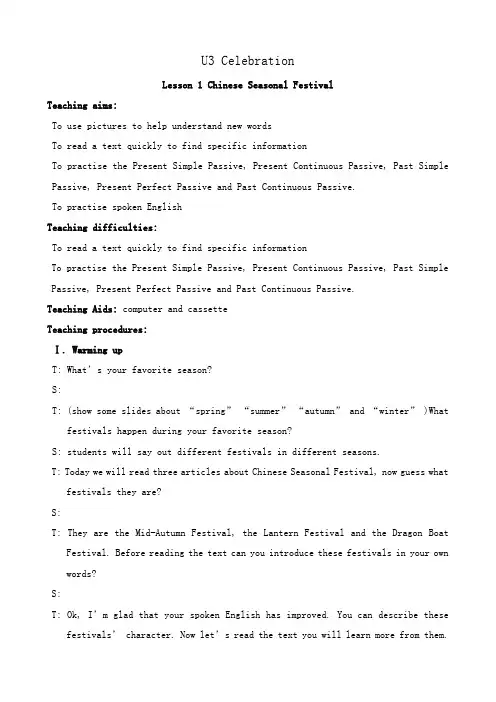
U3 CelebrationLesson 1 Chinese Seasonal FestivalTeaching aims:To use pictures to help understand new wordsTo read a text quickly to find specific informationTo practise the Present Simple Passive, Present Continuous Passive, Past Simple Passive, Present Perfect Passive and Past Continuous Passive.To practise spoken EnglishTeaching difficulties:To read a text quickly to find specific informationTo practise the Present Simple Passive, Present Continuous Passive, Past Simple Passive, Present Perfect Passive and Past Continuous Passive.Teaching Aids: computer and cassetteTeaching procedures:Ⅰ. Warming upT:What’s your favorite season?S:T:(show some slides about “spring”“summer”“autumn” and “winter” )What festivals happen during your favorite season?S: students will say out different festivals in different seasons.T: Today we will read three articles about Chinese Seasonal Festival, now guess what festivals they are?S:T: They are the Mid-Autumn Festival, the Lantern Festival and the Dragon Boat Festival. Before reading the text can you introduce these festivals in your own words?S:T: Ok, I’m glad that your spoken English has improved. You can describe these festivals’ character. Now let’s read the text you will learn more from them.Ⅱ ReadingRead the text and do the exercise (according to these pictures say out the names of festivals)T: Are you interested in these festivals?S:T: Read the text quickly and the following sentences tell me which festival it belongs to?1.On that day, ma ny people try their best to go home to share the feeling of ‘beingtogether’ with families.2. This festival marks the end of the Chinese New Year celebration.3. This festival marks the beginning of the hottest season of the year.4. The special food for this festival is sweet dumplings.5. The festival falls on fifth day of the fifth month of the lunar calendar.6. On that day, the moon is said to be biggest and brightest.Answers: 1.the Mid-Autumn Festival 2.the Lantern Festival 3. the Dragon Boat Festival 4. the Lantern Festival 5. the Dragon Boat Festival 6.the Mid-Autumn FestivalⅢ Talking and speakingDivide the class into three groups. Each group reads one section of the text carefully and writes four or five questions about it. Then give the class three or four minutes to read the whole text again. Students close their books,in turn each group asks its questions for the rest of the class to answer.Do the exercise 3Encourage students to describe other festivals they know well but they can’t tell the name of the festival so that other students will be interested to guess what they are.Ⅳ Voice your opinion1. Do you think too much money is spent at festival times? Why or why not?2. Which festival in China is most important for children? Young people? Old people?Women and men?ⅤgrammarShow students the basic passive structure: be +past participate; be +being + participateCompare a sentence of the active voice with one of the passive voice.Do the exercise 5, 6, 7 and 8Ⅵ VocabularyDo the exercise 9Ⅶ HomeworkDo the exercise 10。
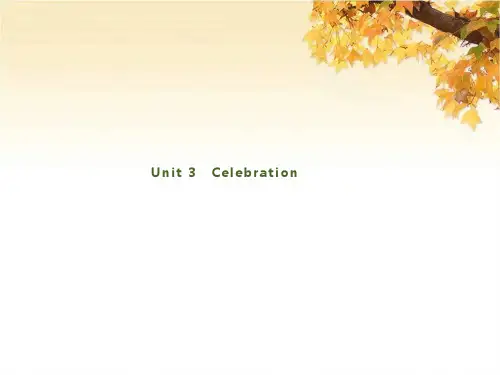
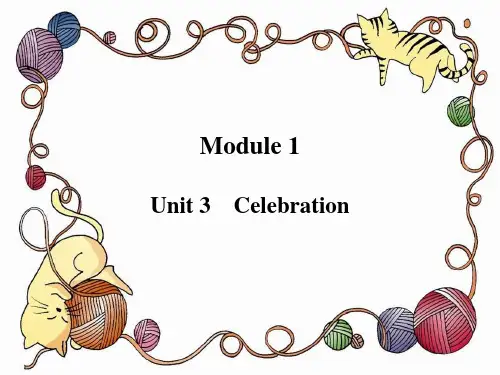
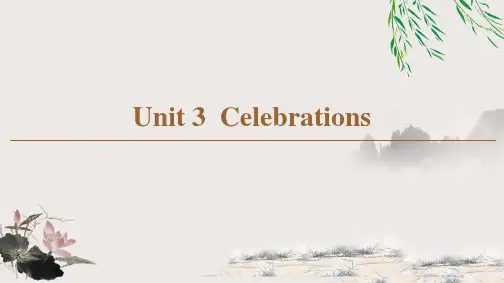
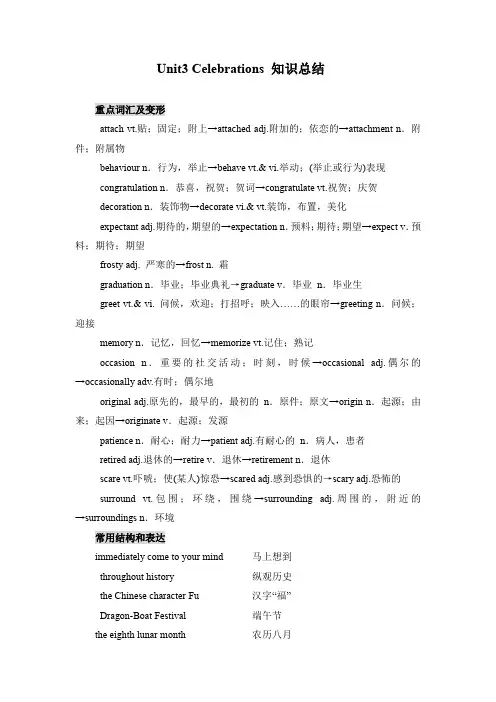
Unit3 Celebrations 知识总结重点词汇及变形attach vt.贴;固定;附上→attached adj.附加的;依恋的→attachment n.附件;附属物behaviour n.行为,举止→behave vt.& vi.举动;(举止或行为)表现congratulation n.恭喜,祝贺;贺词→congratulate vt.祝贺;庆贺decoration n.装饰物→decorate vi.& vt.装饰,布置,美化expectant adj.期待的,期望的→expectation n.预料;期待;期望→expect v.预料;期待;期望frosty adj. 严寒的→frost n. 霜graduation n.毕业;毕业典礼→graduate v.毕业n.毕业生greet vt.& vi. 问候,欢迎;打招呼;映入……的眼帘→greeting n.问候;迎接memory n.记忆,回忆→memorize vt.记住;熟记occasion n.重要的社交活动;时刻,时候→occasional adj.偶尔的→occasionally adv.有时;偶尔地original adj.原先的,最早的,最初的n.原件;原文→origin n.起源;由来;起因→originate v.起源;发源patience n.耐心;耐力→patient adj.有耐心的n.病人,患者retired adj.退休的→retire v.退休→retirement n.退休scare vt.吓唬;使(某人)惊恐→scared adj.感到恐惧的→scary adj.恐怖的surround vt.包围;环绕,围绕→surrounding adj.周围的,附近的→surroundings n.环境常用结构和表达immediately come to your mind 马上想到throughout history 纵观历史the Chinese character Fu 汉字“福”Dragon-Boat Festival端午节the eighth lunar month 农历八月play with lanterns 玩灯笼adults sit together 大人们坐在一起have a barbecue 进行一次烧烤野餐to prepare snacks 准备零食three readers' accounts 三位读者的描述my host family 我的寄宿家庭sweep away the dirt of the past year清除过去一年的积尘as train tickets or flights have to be booked因为必须预订火车票或航班a bottle of wine 一瓶葡萄酒Shanxi accent 山西方言some of the original customs 一些原始习俗be invited to a wedding受邀参加婚礼for teenagers 对于青少年来说listen for specific words like names, numbers or dates听一些特定的单词,比如名字、数字或日期somehow adv. 不知怎的;不知为什么the North Pole 北极on the envelope 在信封上stuff the turkey 给火鸡填馅sit on my granny's lap 坐在奶奶的腿上hang most of the decorations on the branches把大部分装饰品挂在树枝上a plate of sugar biscuits 一盘糖饼干Granny whispered. 奶奶小声说。
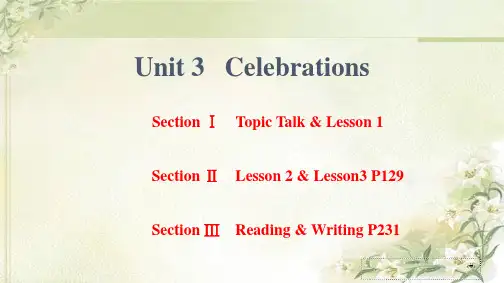
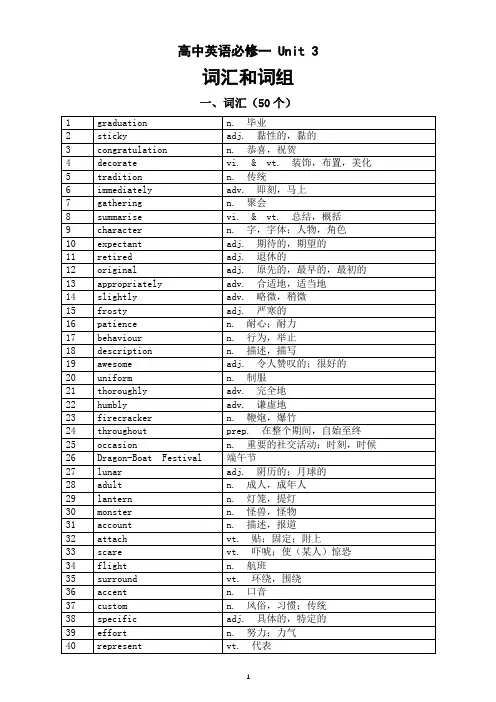
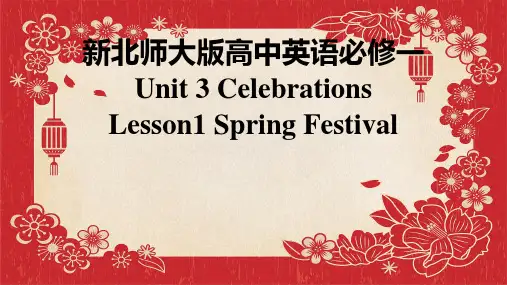
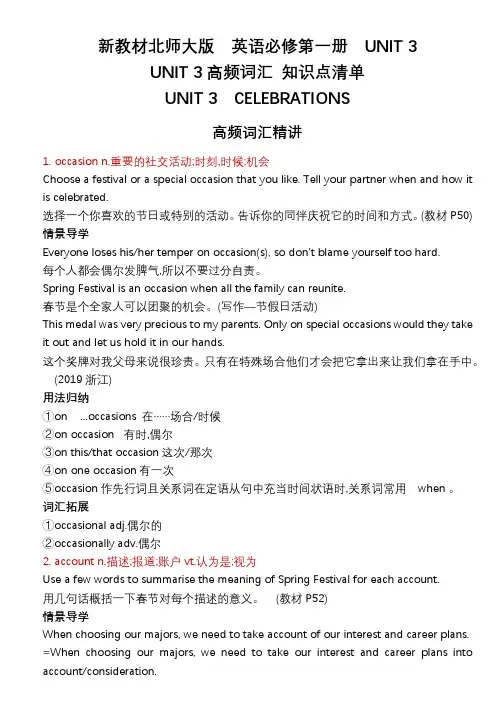
新教材北师大版英语必修第一册UNIT 3UNIT 3高频词汇知识点清单UNIT 3 CELEBRATIONS高频词汇精讲1. occasion n.重要的社交活动;时刻,时候;机会Choose a festival or a special occasion that you like. Tell your partner when and how it is celebrated.选择一个你喜欢的节日或特别的活动。
告诉你的同伴庆祝它的时间和方式。
(教材P50) 情景导学Everyone loses his/her temper on occasion(s), so don’t blame yourself too hard.每个人都会偶尔发脾气,所以不要过分自责。
Spring Festival is an occasion when all the family can reunite.春节是个全家人可以团聚的机会。
(写作—节假日活动)This medal was very precious to my parents. Only on special occasions would they take it out and let us hold it in our hands.这个奖牌对我父母来说很珍贵。
只有在特殊场合他们才会把它拿出来让我们拿在手中。
(2019浙江)用法归纳①on ...occasions 在……场合/时候②on occasion 有时,偶尔③on this/that occasion这次/那次④on one occasion有一次⑤occasion作先行词且关系词在定语从句中充当时间状语时,关系词常用when 。
词汇拓展①occasional adj.偶尔的②occasionally adv.偶尔2. account n.描述;报道;账户vt.认为是;视为Use a few words to summarise the meaning of Spring Festival for each account.用几句话概括一下春节对每个描述的意义。
高中英语必修1(北师大版)Unit 3 Celebration 一、重点词汇scholarship·原文再现winning a scholarship获得奖学金·基本用法scholarship n. 奖学金;学识,学问He won a scholarship to Cambridge.他获得一份到剑桥大学读书的奖学金。
He tops the rest in scholarship.他的学识超过其他人。
·知识拓展--相关单词scholar n. 学者;奖学金获得者He is thought to be a scholar in the village.在村里,人们把他看作是位“秀才"。
He went abroad to study as a scholar.他作为奖学金获得者赴外学习。
A great scholar is not always a very wise man.一位伟大的学者未必一定是极聪明的人。
occasion·原文再现The Mid-Autumn Festival is important because it is a special occasion.中秋节很重要,因为这是一个全家团聚的特殊时机。
·基本用法occasion n. 场合;时机On that occasion he looked a perfect fool.在这个场合,他看起来就像一个大傻瓜。
Please use words suitable to this occasion.请用适合该场合的言词。
You should go there if occasion arises.如果有机会,你应当到那里去。
·知识拓展相关单词occasional adj 有时的;偶尔的occasionally adv 偶尔地;有时相关短语on occasion(s)=sometimeson the occasion of ....在...之际She visits the city on occasion.她有时到城里去。
北师大版高中英语必修一第7讲:U n i t3-C e l e b r a t i o n-词汇篇1(教师版)work Information Technology Company.2020YEARUnit 3 Celebration 词汇篇1___________________________________________________________________________ __________________________________________________________________________________ _______1、掌握第三单元第一课及第二课的重点单词||,短语及句型||。
2、灵活运用第三单元第一课及第二课的重点单词||,短语及句型||。
1.occasion n. 时刻||,时机词汇拓展:①occasional adj. 偶尔的②occasionally adv. 有时||,偶尔短语拓展:①on occasion(s) 偶尔||,有时②on the occasion of 在…的时候③on one/this/that occasion 一次/这次/那次2. including prep. 包括…在内易混辨析:including||, includedincluding: 介词||,“包括…在内”||,后接名词||,代词||,动名词作宾语||。
included: include的过去分词形式||,常做后置定语||。
例:There are 40 students in the classroom||, including me. = There are 40 students in the classroom||, me included. 包括我在内||,教室里有40个学生||。
include||, containinclude: “包括”||,侧重被包含者是整体中的一部分||,通常是同类的人或物||。
contain: “包含||,含有”||,侧重一个整体中包含的内容或成分||,通常是不同类的人或物||。
例:①The tour includes a visit to the science museum. 这次游览包含参观科学博物馆||。
②The book contains all the information you need. 这本书包含所有你需要的信息||。
3. celebration n. 庆祝活动||,庆典词汇拓展:celebrate vt. 庆祝||,庆贺短语拓展:①in celebration of…庆祝…②in memory of…作为对…的纪念③in honor of…为纪念…;为向…表达敬意④in favor of…支持…;赞同…易混辨析:celebrate||, congratulatecelebrate: 指举行仪式||,典礼来“庆祝”||,只能用sth.(节日||,胜利||,成功||,生日等)作宾语||。
congratulate: “祝贺”||,只能用sb. 作宾语||。
常用于congratulate sb. on sth. 结构;名词congratulation||,常用于(offer) congratulation to sb. on sth. 结构||。
例:①I’d like to congratulate you on your wonderful performance. 祝贺你表演的如此出色||。
②Tom celebrated his 24th birthday two days ago. 汤姆两天前庆祝了他的24岁生日||。
4. power n. 控制力||,权力||,能力||,力量词汇拓展:①powerful adj. 有影响力的||,强有力的②powerfully adv. 有影响力地||,强有力地短语拓展:①in power 在执政②come into power 上台||,开始执政易混辨析:①power: 水||,电等的动力;人的权利||,能力②energy: 指人的精力;物的能||,能量||,能源③force: 使人或物朝某方向运动的外力;武力④strength: 体力||,力气;优势||,强项5. destroy vt. 破坏||,毁坏词汇拓展:destruction n. 破坏易混辨析:destroy: 常指对物体毁灭性的||,不可修复的破坏;也可指希望||,信心的破灭或摧毁damage: 常指对物体的局部的||,可以修复的损害||,意味着损害后价值或效率降低||。
do damage to…对…有损害||。
harm: 常指对身心健康或名声的危害||。
do harm to对…有危害例:①The whole building destroyed by a fire. 一场大火毁掉了整座大楼||。
②A heavy rain came down and damaged the crops. 下了一场大雨||,损坏了庄稼||。
③The bright sunlight will harm your sight. 强光对你的视力有危害||。
6. decorate vt. 装饰||,布置词汇拓展:decoration n. 装饰||,装潢||,装饰品短语拓展:①decorate … with …用…装饰…Tom has decorated his room with some photos of sports stars. 汤姆用体育明星的照片装饰房间||。
②be decorated with 装饰着…The streets are decorated with flags. 街道上装饰着旗帜||。
7. serve vt. 提供(食物)||,端上(饭菜)词汇拓展:①service n. 服务②servant n. 仆人短语拓展:①serve sb. sth. = serve sth. to sb. 给某人端上某物②serve sb. 为某人服务||,伺候某人③serve in the army 服役④serve as 充当||,担任8. tradition n. 传统||,惯例词汇拓展:①traditional adj. 传统的②traditionally adv. 传统地短语拓展:①by traditional 根据传统②follow a tradition 遵循传统③break with tradition 打破传统9. apply vi. 申请词汇拓展:①applicant n. 申请人②application n. 申请;应用短语拓展:①apply (to) sb. For sth. (向某人)申请某事②apply…to…把…应用到…③apply oneself to (doing) sth. 勤奋工作||,努力学习10. burn down 烧毁The house was burnt down in half an hour. 这所房子在半小时内被烧毁||。
短语拓展:①burn up 被烧毁;焚毁;消耗(体能||,热量等)②burn out 烧尽;耗尽体力I was burnt out after a day’s walk. 走了一天的路||,我累坏了||。
③burn…to the ground 将…烧成平地the great fire burnt the teaching building to the ground. 大火将教学楼分为平地||。
④burn… to ashes 把…烧成灰烬11. take part in 参加||,参与易混辨析:attend||, join||, join in||, take part in①attend: 常指“参加”会议||,仪式||,婚礼||,葬礼||,典礼或上课||,上学||,上教堂||,听报告||,演讲||,音乐会等||。
He’ll attend an important meeting tonight.②join: 表示“加入”(=become a member of)||,宾语是组织||,团体||,人||,如:参军||,入团||,入党||,加入俱乐部等||。
She joined the company three months ago.③join in: 常指“参加”娱乐||,游戏||,散步||,讨论等活动;join sb.In(doing) sth. 加入到某人的行列一起做某事||。
Will you join us in walking.④take part in 常指“参加”大兴会议或集体性的活动;take an active part in 积极参加We took part in social activities during the weekend.12. depend on/upon 根据||,依据词汇拓展:①dependent (on) adj. 依靠的||,依赖的②dependence n. 依靠||,依赖③independent adj. 独立的④independence n. 独立短语拓展:①depend on sb. / sth. 依靠某人、某物②depend on sb. for sth. 指望某人某事③depend on sb. to do sth. 指望某人做某事④depend on it (that) …相信…||,指望…⑤it (all) that depends. 看情况/视情况而定13. on time 准时短语拓展:①in time 及时②at times (=sometimes=from time to time)有时③at a time 每次||,依次④at one time 曾经||,一度⑤at any time 随时||,在任何时候⑥at all times 总是||,随时||,永远⑦in no time 立刻||,马上⑧at no time 绝不⑨at the same time 同时14.sb. / sth. is said to do …据说某人、某物…本结构中的不定式根据句意的表达可以用它的一般时||,进行时或完成时||。
能够在此句型中使用的常用动词有:think||, report||, believe||, suppose||,consider等||。
次句型可转换为“It is said that…”的形式||。
例:He is said to be an honest man. = It is said that he is an honest man. 据说他是一个诚实的人||。